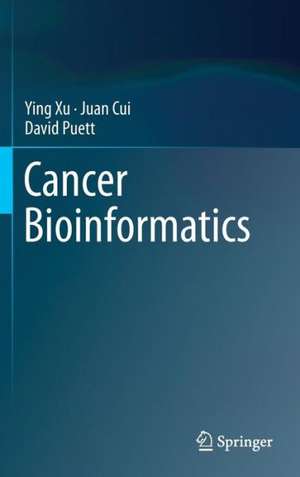Cancer Bioinformatics
Autor Ying Xu, Juan Cui, David Puetten Limba Engleză Hardback – sep 2014
| Toate formatele și edițiile | Preț | Express |
|---|---|---|
| Paperback (1) | 393.90 lei 6-8 săpt. | |
| Springer – 17 sep 2016 | 393.90 lei 6-8 săpt. | |
| Hardback (1) | 408.92 lei 6-8 săpt. | |
| Springer – sep 2014 | 408.92 lei 6-8 săpt. |
Preț: 408.92 lei
Nou
Puncte Express: 613
Preț estimativ în valută:
78.25€ • 81.54$ • 64.79£
78.25€ • 81.54$ • 64.79£
Carte tipărită la comandă
Livrare economică 03-17 aprilie
Preluare comenzi: 021 569.72.76
Specificații
ISBN-13: 9781493913800
ISBN-10: 1493913808
Pagini: 396
Ilustrații: XXVI, 368 p. 68 illus.
Dimensiuni: 155 x 235 x 30 mm
Greutate: 0.91 kg
Ediția:2014
Editura: Springer
Colecția Springer
Locul publicării:New York, NY, United States
ISBN-10: 1493913808
Pagini: 396
Ilustrații: XXVI, 368 p. 68 illus.
Dimensiuni: 155 x 235 x 30 mm
Greutate: 0.91 kg
Ediția:2014
Editura: Springer
Colecția Springer
Locul publicării:New York, NY, United States
Public țintă
ResearchCuprins
Basic cancer biology.- Omic data, information derivable and computational needs.- Cancer classification and molecular signature identification.- Understanding cancer at the genomic level.- Elucidation of cancer divers through comparative omic analyses.- Hyaluronic acid: A key facilitator of cancer evolution.- Multiple routes for survival: Understanding how cancer evades apoptosis.- Cancer development in competitive and hostile environments.- Cell proliferation from regulated to deregulated state via epigenomic responses.- Understanding cancer invasion and metastasis.- Cancer after metastasis: The second transformation.- Searching for cancer biomarkers in human body fluids.- In silico investigation of cancer using publicly available data.- Understanding cancer as an evolving complex system: our perspective.
Caracteristici
Focuses on the understanding of cancer biology from an informatics perspective Provides a unified conceptual framework for studying a variety of cancer related problems by considering cancer a process of cell survival through cell proliferation Teaches hypothesis-driven omic data mining and statistical inference of mechanistic relationships important to cancer initiation, progression, metastasis and post-metastasis development Gives a large collection of examples related to different aspects of cancer study using omic data analyses to answer a wide range of questions Includes supplementary material: sn.pub/extras















